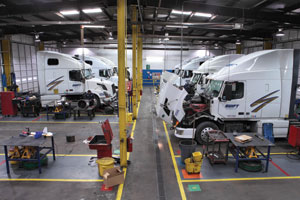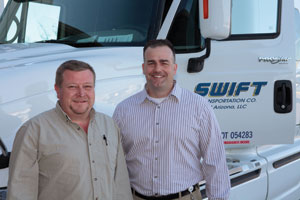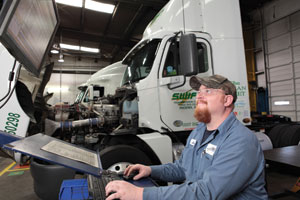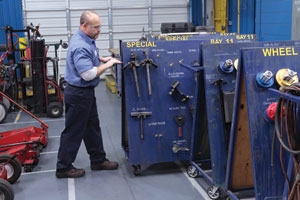 Jeff Harris, director of shop operations, training and compliance for Swift, attributes much of the fleet’s success to its recent adoption of Six Sigma Lean, the objective of which is to reduce process output variation. In other words, it’s all about efficiency, and that’s how Swift got started enabling its green objectives.
Jeff Harris, director of shop operations, training and compliance for Swift, attributes much of the fleet’s success to its recent adoption of Six Sigma Lean, the objective of which is to reduce process output variation. In other words, it’s all about efficiency, and that’s how Swift got started enabling its green objectives.
According to Harris, “A while back, a few of us visited some manufacturing plants and saw first-hand how efficiently the facilities were run using Six Sigma. We were impressed and decided those are the kinds of processes that would also benefit our shops.” When the fleet started adopting those practices, it discovered increased operating efficiencies, which also helped to accomplish its goal of being an environmentally responsible carrier.
Harris says that organizing the shop with Six Sigma Lean objectives has made all the difference. The shop now benefits from a number of physical and logistical improvements. For one thing, the parts department now delivers parts to the technicians on the floor. The bays all have red and green squares for parts delivery and pick-up. Parts that arrive in the bays prior to each maintenance job and are placed in the green square; the old parts from the previous job are placed in the red squares and are taken away by the parts department delivery person after dropping off the new parts.
“We have also mapped the entire shop area for equipment staging,” Harris adds. “The technicians just look outside to see how the trucks are lined up so they know which jobs are next. We have completely eliminated the need for a service vehicle to go searching for the trucks prior to each job.”

Other efficiencies include the addition of shadow boards between each bay that include all the tools for each job. For example, tire boards have air hoses, impact wrenches and other tools needed to change tires. Technicians have everything they need within reach and don’t have to waste time searching for the right tools. Russ Thompson, vice president of equipment purchasing and shop operations, says, “This has reduced technician footsteps by 75%. In addition, we found that now we are only buying the right tools that are needed and have eliminated excess. In the past, shops either had too many tools, or didn’t have the right tools for the job.”
Return to basics
The new efficiencies at the shop have led to the return of some old practices. The fleet has gone back to using mops and buckets for cleaning. Harris says the fleet has gotten rid of its electric floor scrubbers, which often needed repairs, added to electrical usage and created wasted time while technicians waited for someone to come with a machine for clean-up. With floor mops, technicians are able to clean up after every service job and between shifts.
“We run a three-step clean-up program, which includes spill control training for all our technicians. We have incorporated spill control stations in our shops and have built our own Spill Prevention, Control, and Countermeasure (SPCC) training programs to include dispensing fluids and preventing spills.”
The training is part of a corporate-wide program called Swift University, which has 70 courses for technicians detailing maintenance and shop practices. Technicians have access to the programs on the shop floor via computer, and can access repair and other data any time it is required. Headsets are supplied so technicians are better able to hear instructions. Harris says shop technicians already have completed 26,000 courses since April 2010.

As for recycling fluids, “We have outside companies remove waste fluids and sell our used oil for recycling,” Harris reports. “In addition, we have built our own fuel recycling equipment; rather than dump out fuel that is left in fuel filters during preventive maintenance, now the fuel is run through a filter and reused for filter priming.” He added that since the system was put in place; the company has the potential to save $60,000 to $70,000 on diesel fuel used to prime filters. The number is calculated off 50,000 services per year, he notes.
As another energy-saving move, the fleet has moved away from fuel-powered battery boost-off machines to electrical boost-off equipment. It has incorporated smart chargers for recharging batteries, which will turn off the circuit when the battery is charged. This also is a safer practice.
In addition, the shop has switched to radiant heaters, which eliminate noise pollution and provide greater heating efficiency while lowering electrical usage.
Charles Nall, shop manager at Swift’s Memphis facility, says, “We have installed a new rotary screw air compressor that runs the whole shop—that’s 26 bays in one area and six bays in another building. The old ones were noisy and used a lot of electricity, but the new ones are quiet and efficient.”
Other physical changes to the building that help save on electricity are the addition of 12 skylights. Nall says that during the day the fleet is able to turn off the lights and use natural light in the work bays. Also, the shop has installed high intensity fluorescent lights that use 50% less electricity.

Like most shops, the Swift facility has parts washers, but following the Six Sigma Lean guidelines, they are placed at staggered locations throughout the facility so technicians never have to go far to access one.
As for other efficiencies, Nall notes, “We used to use retractable air lines, but we replaced them because they leaked and would break down. We’ve gone back to manual roll-up reels and have no problems.
“All of these changes are a part of our commitment to sustainability through the Six Sigma Lean initiative,” Nall adds.
Keeping equipment longer
Another part of Swift’s green initiatives includes keeping its trailers and steels wheels in service longer by refurbishing them. According to Thompson, “We have developed a trailer refurbishing problem. Typically, trailers last about 10 years, but we have been able to add five years of life to our trailers by re-doing the floors, adding new doors, re-undercoating, repainting and adding new decals, plus making sure they pass a full mechanical inspection before going back in service.
Steel wheels are also refurbished using an in-house machine to sandblast old paint and contaminants. All materials are vacuumed as they are removed, stored and hauled away by licensed and certified waste haulers. The wheels are then powder-coated and returned to service. The cost per wheel is about $14 or $15—and the longer wheels are in service, the less scrap metal there is to dispose of.
The fleet reduces oil waste by keeping engine oil in the truck longer. Thompson says the fleet has extended PM oil drain intervals by 15% this year.
‘Green’ future
Harris concludes, “While the EPA rules that mandate a cleaner environment can be costly, we at Swift recognize that they are in place to help fleets reduce their carbon footprint. For us, going green is an ongoing process—we are a work in progress on a direct path to become a ‘Best in Class’ transportation provider.”
